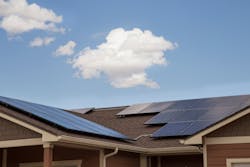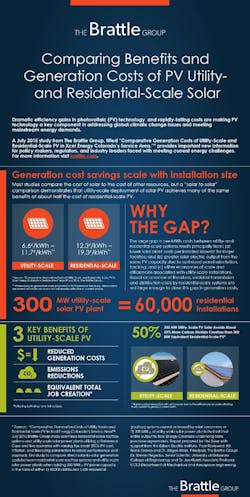Utility-Scale Solar PV More Cost-Effective than Rooftop
A study released by economists at global consulting firm The Brattle Group finds that utility-scale solar photovoltaic (PV) systems in the U.S. are significantly more cost effective than residential-scale (rooftop) PV systems as a vehicle for achieving the economic and policy benefits of PV solar. This study, "Comparative Generation Costs of Utility-Scale and Residential-Scale PV in Xcel Energy Colorado's Service Area," is the first to focus on a "solar to solar" comparison of equal amounts of residential- and utility-scale PV solar deployed on an actual utility system.
The key findings of the study include:
- The generation cost of energy from 300MW of utility-scale PV solar is roughly one-half the cost per kWh of the output from an equivalent 300MW of 5kW residential-scale systems when deployed on the Xcel Energy Colorado system, and utility-scale solar remains more cost effective in all scenarios considered in the study.
- In that same setting, 300MW of PV solar deployed in a utility-scale configuration also avoids approximately 50% more carbon emissions than an equivalent amount of residential-scale PV solar.
"Over the last decade, solar energy costs for both rooftop and bulk-power applications have come down dramatically," said Dr. Peter Fox-Penner, Brattle principal and co-author of the study. "But utility-scale solar will remain substantially less expensive per kWh generated than rooftop PV. In addition, utility-scale PV allows everyone access to solar power. From the standpoint of cost, equity, and environmental benefits, large-scale solar is a crucial resource."
Using real-world scenarios based on data from Xcel Energy Colorado, the study compares the per-MWh customer supply costs of adding 300MWDC of PV panels in the form of either 60,000 distributed 5kW rooftop systems owned or leased by retail customers, or 300MW of utility-scale solar power plants that sell their entire output to Xcel Energy Colorado under long-term power purchase agreements. The analysis finds that projected 2019 utility-scale PV power costs in Xcel Energy Colorado's service territory will range from $66/MWh to $117/MWh (6.6¢/kWh to 11.7¢/kWh) across all scenarios, while projected power costs for a typical, customer-owned PV system will range from $123/MWh to $193/MWh (12.3¢/kWh to 19.3¢/kWh). These prices are based on historical data, and are not necessarily reflective of current market prices.
The study attributes the large difference in per-MWh costs between systems primarily to economies of scale and greater solar electric output resulting from optimized panel orientation and tracking assumed for utility-scale systems. The improved orientation and tracking of utility-scale solar also result in a higher capacity factor that causes it to avoid approximately 50% more carbon dioxide emissions than the same capacity of residential-scale solar PV on the Xcel Energy Colorado system. The reason utility-scale solar saves so much more carbon than rooftop PV is because the solar energy per MW is much higher on utility-scale due to better placement and tracking capability.
"Thoughtful energy policy requires a thorough understanding of the relative costs of utility- and residential-scale solar PV for achieving policy goals," said Mr. Frank Graves, Brattle principal and leader of the firm's utilities practice. "By directly comparing the costs and benefits of PV solar deployed in equal amounts of residential- and utility-scale systems based on utility-supplied data, the Brattle study provides a key contribution to the policy discussion about solar PV and should be essential reading for regulators and other policy makers."
The report was prepared for First Solar, with support from the Edison Electric Institute.

